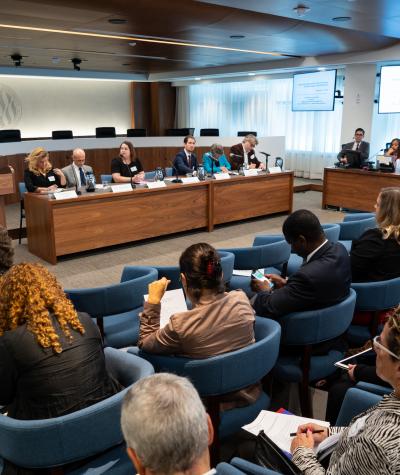Federal Election Commission (FEC) Chairwoman Ellen Weintraub co-sponsored a symposium on September 17, 2019 on the topic of digital disinformation and the threat to democracy. One of the major focal points of the discussion concerned how to increase transparency in digital ads on social media platforms.
Snapchat announced, also on September 17, that it will launch a political ad library and list all political ads purchased on its platform, and amounts spent on each ad. But because there is no law requiring disclosure and transparency in political advertising on social media, individual companies can decide whether to make any disclosures at all and the form of any disclosures they chose to make. This has resulted in inconsistent policies and practices.
Tech giants have made attempts to voluntarily increase the transparency fo the political advertising on their platforms, which is certainly a positive step, but as CLC's Brendan Fischer recently told the Washington Post, "the big shortcoming in any of self-regulatory efforts is that any effort by a particular platform is not going to apply to any other platform.” Fischer also noted that when tech companies are left to self-regulation, many smaller social media companies that also sell political ads may not participate.
Sen. Mark Warner, Vice Chair of the Senate Select Committee on Intelligence and keynote speaker at the FEC Symposium, also pointed out that “instead of dealing with the misuse of their platforms, large companies have externalized the responsibility of identifying harmful and illegal activity to journalists, academics, and independent activists.”
He continued by saying “I think folks have the right to know if the information they are receiving is coming from a human being or a bot. I also put forward legislation called the HONEST Ads Act that would require greater transparency and disclosure for online political ads.”
The Holding Online National Electioneering ads to the Same Test (HONEST) Ads Act would modernize the laws that ban foreign election interference and foster transparency around political spending by requiring that paid internet ads be subject to the same disclaimer and recordkeeping rules that currently apply to television ads and radio ads.
Special Counsel Robert Mueller’s report confirmed that “the Russian government interfered in the 2016 presidential election in sweeping and systematic fashion.” But as Brendan Fischer noted in February 2018: “had effective online disclaimer and disclosure laws been in place in 2016, Russia’s wide-ranging influence campaign might have been detected sooner—or Russia might have been deterred from engaging in the effort in the first place.”
In January 2018, CLC released a report on foreign interference in U.S. elections, which outlined the many vulnerabilities that left the US election system exposed to foreign interference, allowing the Russian government to influence our election in a sweeping and systematic fashion. Among the recommendations given in the report was for Congress to strengthen campaign disclosure laws by passing the bipartisan HONEST Ads Act.
A version of the HONEST Ads Act was passed in the House as a component of HR 1, House Democrats’ government ethics and election reform bill, but the act has yet to be given a hearing in the Senate. Congress should hold hearings on and pass the HONEST Ads Act to increase transparency in political advertisement spending, and close a major loophole that allows foreign entities to interfere in American elections.
This post was written by Sheely Edwards, a 2019 CLC Hinckley intern, and student at the University of Utah.
